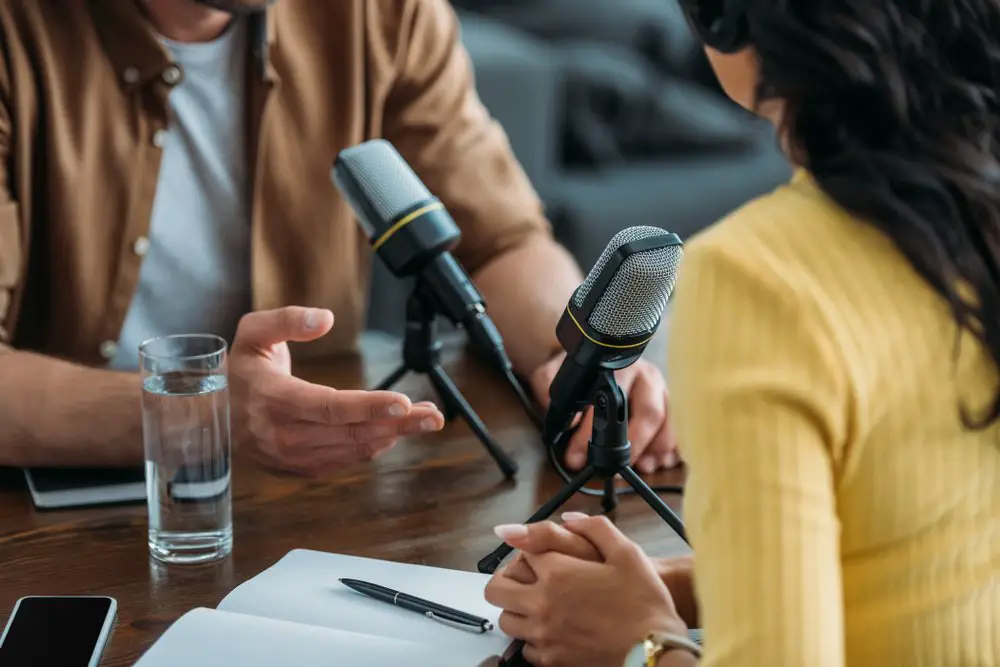Many people use OBS to create their podcasts. But OBS is predominantly used for live streaming and video recording, so asking how well-suited it is for podcasting is quite the question.
In this article, we will discuss what OBS is, how it works, what equipment requirements are to use it, whether it’s any good for podcasting, and how to use it.
Then we’re going to look at some of the most popular alternatives.
So, let’s get down to the nitty-gritty.

Table of Contents
What is OBS?
OBS stands for Open Broadcaster Software and is now referred to as OBS Studio for those who don’t know. It is widely used by professional gamers, streamers, educators, and hobbyists.
With OBS, users can easily capture quality footage while accessing advanced tools that allow the editing of video sources.
The software suite is the whole package – it can do both recording and live streaming, providing real-time source and device capture, scene composition, encoding, recording, and, of course, broadcasting.
You can stream on Twitch, YouTube, and Facebook.
How does OBS work?
OBS uses a powerful combination of real-time video/audio capturing and mixing, unlimited scene switching, and a wide array of overlays, filters, transitions, and other special effects.
Utilizing GPU acceleration technology, OBS provides streaming, encoding, recording, and even scene composition capabilities. This intuitive software makes setting up live streaming an effortless experience – you can easily create complex scenes using its graphical user interface.
What do I need to use OBS?
To ensure that OBS works efficiently and effectively, you must meet some important requirements.
Firstly, you will need a reliable internet connection with at least 6-8mbps download speeds for a high-quality video stream. You will also need a powerful computer with 4GB or higher RAM.
In addition to the correct operating system, Windows, Mac, or Linux, you’ll also need your PC to have an AMD FX series or Intel i5 2000-series processor (dual or 4-core preferable) or higher and a DirectX 10 capable graphics card.
To get the most from your streaming experience, consider investing in an external microphone and headset to maximize audio quality.
Is OBS good for podcasts?
OBS Studio predominantly aims at live video production, including video acquisition, compositing, and creation. Compared to its competition, OBS studio requires far less equipment and takes up less hosting space.
Technically, OBS can be used for podcasting, and we’ll explain how later. However, it’s important to note that recording or streaming audio-only input on OBS is impossible.
For this reason, it would only be fair to say that OBS Studio might not be the best tool for an audio-only production.
However, we would argue that that’s not necessarily a bad thing. Sometimes it’s better to incorporate body language and/or facial expressions into whatever you want to convey.
So, if video podcasting appeals to you, you could broadcast live or recorded videos featuring your brand logo alongside your podcast audio. This way, you could help attract a larger audience for your content.
How do I use OBS to record my podcast?
Some things are best explained via a demonstration rather than mere words, so please check out this quick YouTube video which shows you how to record podcasts with OBS Studio.
Or, for a more in-depth walkthrough, you could read the blog post available on this link, which also discusses different web hosts and their prices.
Alternative Podcasting Software
As we mentioned, OBS Studio does not allow you to record or live stream audio only. So if you’ve decided that you only want to record audio, you might be interested in using other free, open-source software.
In this case, we would recommend using Audacity.
Audacity is a free, open-source, cross-platform audio app. It’s an easy-to-use, multi-track audio editor and recorder for Windows, Mac OS, and Linux. It can record live audio through a microphone or mixer and capture streaming audio.
To download the Audacity app, click here.
But Audacity is not without its competition, and you may also want to try GarageBand, another free, open-source audio recording and mixing app. To look at what GarageBand has to offer and to get the download, click here.
My website also features an article comparing and contrasting Audacity and GarageBand, complete with a handy FAQ section. You can access it here.
Then, if you were prepared to spend money on podcasting software, your options include Adobe Audition. To look at what Adobe Audition has to offer and to get the download, click here. You can start with a free trial to test it out.
Final Words
So, there are several benefits to using OBS Studio for your podcast, including turning your podcast into a video that you can upload to the like of YouTube and attract a bigger audience.
And as well as creating recordings, you can also use it for live streaming.
But there is a caveat with using OBS Studio: it does not allow you to record audio-only content. So, if you’ve decided that you only want to record audio, then, by all means, you should explore your options.
In short, OBS can be used for recording, streaming, and podcasting. But to ensure this software suits you, you should first look at your podcasting goals and needs.